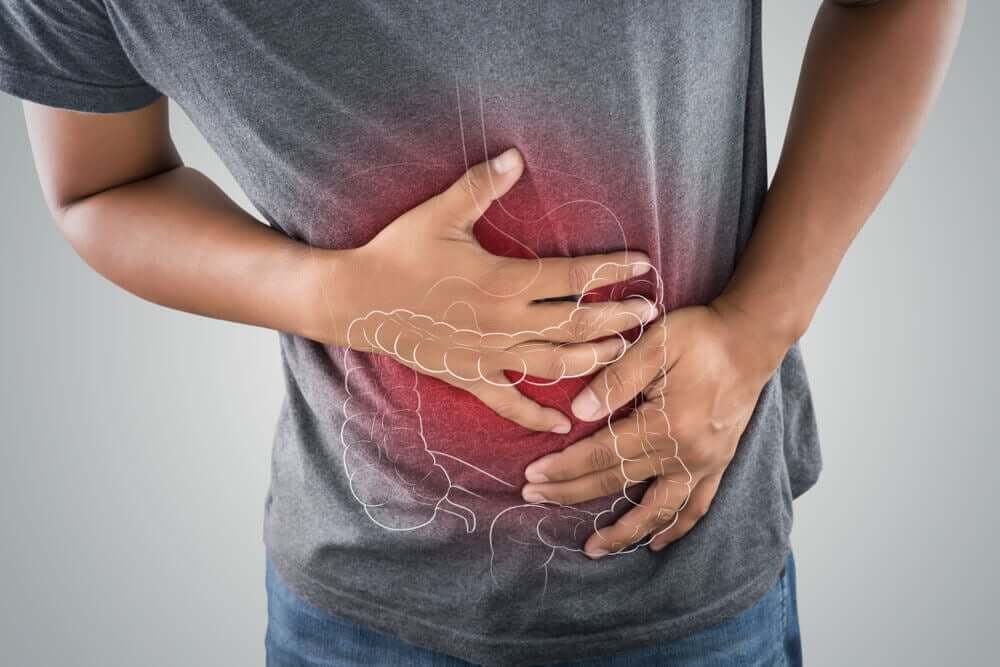What Causes Abdominal Swelling After Meals?


Written and verified by the doctor Leonardo Biolatto
Abdominal swelling after meals is a common problem. It can inevitably make us feel uncomfortable, and can even be painful.
It may lead us to feel trapped in our own clothes, and we then often criticize ourselves, thinking that we must have eaten too much, or that we’re gaining weight. However, that’s not always the case.
The medical term for a swollen belly is abdominal distension. This can occur due to several causes. Gas is the most frequent cause, usually produced by habits that negatively impact digestion. Intolerance to certain foods is also a possible cause, in addition to many other situations.
By knowing the cause of your abdominal distension, it becomes possible to put a stop to the discomfort felt after every meal. In this article, we’ll explain everything you need to know about abdominal swelling after meals so that you’ll be able to remedy it.
What are the causes of abdominal swelling after meals?

As we’ve mentioned, most of the time abdominal swelling is due to gas that accumulates in some part of our digestive tract, whether it’s in the intestine or the stomach. This gas causes the abdomen to become distended, leading to discomfort and even pain. It’s important to know that this production of gases can arise from many causes, especially our eating habits.
First and foremost, we must know that the amount of time we dedicate to eating has a notable effect on this problem occurring. Not chewing correctly or eating in a hurry leads to swallowing air with our food, which ends up accumulating in our abdomen.
In the same way, the type of food we ingest is also a determining factor. For example, certain foods lead to slower digestion or increased production of gases that lead to a swollen abdomen. Legumes are a good example.
People with food intolerance or a food allergy also often suffer from abdominal swelling. This occurs because they’re unable to digest that food correctly. Lactose intolerance is one of the best examples.
Abdominal swelling can even be due to fluid retention that often occurs just before menstruation in many women.
Also, the clinical situation known as ascites is a serious form of fluid retention in the abdomen. In general, it’s linked to more systemic ailments such as cirrhosis, portal hypertension, or advanced heart failure.
However, we shouldn’t forget that abdominal swelling can simply be related to a specific case of poor digestion, or having eaten too much.

You might enjoy reading: Stomach Gas: Four Natural Remedies
Can it be linked to disease?
In many cases, abdominal swelling can be a symptom signaling that something isn’t working correctly in your digestive tract. As we’ve mentioned, food intolerances or allergies often cause this symptom.
On the other hand, several studies show that many intestinal disorders manifest in this way also. Irritable bowel syndrome, Crohn’s disease, or ulcerative colitis are conditions that involve this symptom.
People who suffer from these illnesses often have other symptoms, such as diarrhea or abdominal pain. It’s important to know that abdominal swelling can even be a sign of cancer, although much less frequently.
However, when it comes to cancer, the symptoms tend to be more aggressive. They might include blood in the stool, appetite loss, and usually weight loss. Remember that if any of these symptoms occur, even if isolated events, you should consult your doctor.
You might enjoy reading: 7 Common Causes of Excess Stomach Gas
What can be done to prevent abdominal swelling?
If you often have a swollen belly after meals, the best advice is to visit your doctor. It usually doesn’t indicate a major health problem, but it’s best to rule out any possible disease that could be causing it.
Additionally, you should watch what you eat, and take your time eating. Try to eat slowly, chew correctly, and eat healthy foods. For example, drink water instead of alcoholic beverages or soda when you’re eating.
Moreover, try not to eat too much, and don’t go overboard with high-fiber foods, since digesting them involves producing a lot of gas.
All cited sources were thoroughly reviewed by our team to ensure their quality, reliability, currency, and validity. The bibliography of this article was considered reliable and of academic or scientific accuracy.
- Seo, A. Y., Kim, N., & Oh, D. H. (2013). Abdominal bloating: pathophysiology and treatment. Journal of Neurogastroenterology and Motility, 19(4), 433–453. https://doi.org/10.5056/jnm.2013.19.4.433
- Hinchazón y distensión abdominal – Artículos – IntraMed. (n.d.). Retrieved September 12, 2019, from https://www.intramed.net/contenidover.asp?contenidoid=91090
- Distensión abdominal – familydoctor.org. (n.d.). Retrieved September 12, 2019, from https://es.familydoctor.org/condicion/distension-abdominal/
- Mi barriga se inflama cuando como, ¿qué puede estarme pasando? – Fundación Española del Corazón. (n.d.). Retrieved September 12, 2019, from https://fundaciondelcorazon.com/nutricion/dieta/2065-cuando-como-siento-que-la-barriga-se-me-inflama-ique-puede-estarme-pasando.html
This text is provided for informational purposes only and does not replace consultation with a professional. If in doubt, consult your specialist.








